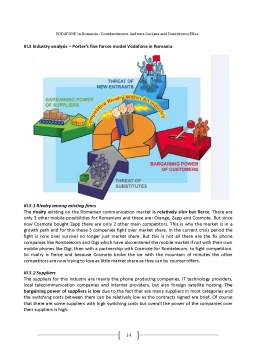Cuprins
- All about Vodafone 3
- Vodafone’s Internalization 3
- II.1 Establishing an International Presence 5
- II.2 Creating Business Synergies 5
- II.3 Generating Revenues through Exporting 6
- II.4 Earning Capital Gains 6
- Strategy formulation 7
- III.2 Internal Environment Assessment 9
- III.2.1 Physical Resources And Personnel Competencies 9
- III.2.2 Value Chain Analysis 10
- III.2.3 Firm-Specific Advantages 10
- III.2.4 Country-Specific Advantages 13
- III.3 Industry analysis – Porter’s five forces model Vodafone in Romania 14
- III.3.1 Rivalry among existing firms 14
- III.3.2 Suppliers 14
- III.3.3 Buyers 15
- III.3.4 New entrants 15
- III.3.5 Substitutes 15
- Functional Strategies 16
- IV.1 Marketing Strategy 16
- IV.1.1 Product 16
- IV.1.2 Place 17
- IV.1.3 Price 17
- IV.1.4 Promotion 17
- IV.2 Human Resources Strategy 17
- IV.2.1 Training and Development 18
- IV.2.2 Reward systems 18
- IV.2.2.1 Compensation 19
- Conclusion 19
- Appendix 22
- References: 23
Extras din proiect
I. All about Vodafone
It's a well known fact that no business can exist without customers. Marketing and human resource strategies, like any aspect of business, are practiced art that take time and effort to master. That is why it is important to check if companies, like Vodafone, do their best to fulfill their strategies. We live in a world dominated by communication; people everywhere are obsessed with the idea of having a cell phone, especially in Romania. Not only do adults have mobile phones but also teenagers, even children of 8-9 years.
We decided a telecommunication company is appropriate and we choose Vodafone. Vodafone Group is the world's leading mobile telecommunications company, with a significant presence in Europe, the Middle East, Africa, Asia Pacific and the United States through the Company's subsidiary undertakings, joint ventures, associated undertakings and investments. It was formed in 1984 as a subsidiary of Racal Electronics Plc. Then known as Racal Telecom Limited, approximately 20% of the Company's capital was offered to the public in October 1988. It was fully developed from Racal Electronics Plc and became an independent company in September 1991, at which time it changed its name to Vodafone Group Plc. At 30 September 2009, based on the registered customers of mobile telecommunications ventures in which it had ownership interests at that date, the Group had 323 million customers, excluding paging customers, calculated on a proportionate basis in accordance with the Company's percentage interest in these ventures.
The Company's ordinary shares are listed on the London Stock Exchange and the Company's American Depositary Shares ('ADSs') are listed on the NASDAQ Stock Exchange and were valued at approximately £71.2 billion at 12 November 2009. Vodafone employs approximately 55,000 people worldwide and intends to enlarge the teams every year with young, intelligent and hard-working employees. Besides their human resources advantage, because the are known for their careful selection of employees, for the numerous tests the candidate has to take and for the professional trainings, they also have the advantage of information, as they spend hard on research for things as employee satisfaction marketing strategy.
A telecommunication company was the most appropriate one, because their marketing strategies and human resourse ideas had the most effective result applied on telecommunication companies. So, that is the reason for which we choose Vodafone.
II. Vodafone’s Internalization
The internationalization strategies of major mobile network operators (MNOs) like Vodafone refer to the relationship between their degree of involvement in international business operations and the degree of equity participation.
In recent years, there has been widespread and rapid internationalization of a wide variety of telecommunication carriers, including mobile network operators (MNOs). This is a trend that has accompanied the general level of accelerated economic globalization that has taken place since the mid-1980s. Most major telecommunication carriers have managed to become international companies by successfully expanding their businesses overseas. In particular, investments in mobile telecommunications have been more active than those in fixed telecommunications, as opportunities to expand successfully in fixed telecommunication services are limited by the last mile
Increased investments abroad may result from the combined interaction of the environmental forces of policy and technology and the various strategic factors of telecommunication companies.
The factors influencing this kind of internationalization are so diverse that patterns and motivations may appear chaotic in real-world cases, so they are usually difficult to explain. These motives and incentives are used to derive four key strategies.
The first influential factor is the regulatory environment of Romania. Internationalization has become possible partly due to shifts in environmental forces, such as deregulation, privatization, and liberalization, since the 1990s when the communist regime fell. Telecommunications, historically considered a natural monopoly and a domestic industry, is now bringing new opportunities for players in the international market — a trend which has been accelerated by the World Trade Organization (WTO) agreement, made in 1997, for the telecommunications sector.
The second factor is growth concerns. MNOs often have incentives to invest abroad in order to avoid the fiercely competitive situations in their own domestic markets. As any given telecommunications market grows and matures, domestic demand for mobile services soon reaches a saturation point and shows limited growth opportunities. Moreover, widespread deregulation and increased competition in once protected domestic markets may prompt MNOs to vigorously seek new foreign markets. Such growth concerns are the main motivation behind the internationalization efforts of all other MNOs which have invested in foreign markets with the purpose of increasing overall revenues in their consolidated financial statements.
The third factor is economic gains. MNOs with bigger networks can utilize economies of scale when constructing networks and managing traffic (especially if those networks are contiguous enough) and can realize enhanced buying power. International companies can benefit from arbitrage and diversification of investment portfolios across diverse markets. Moreover, operators with competitive and comparative advantages may earn revenues by using existing assets in management and technical know-how as test-beds in their further expansion.
Preview document
Conținut arhivă zip
- Vodafone in Romania.doc







































